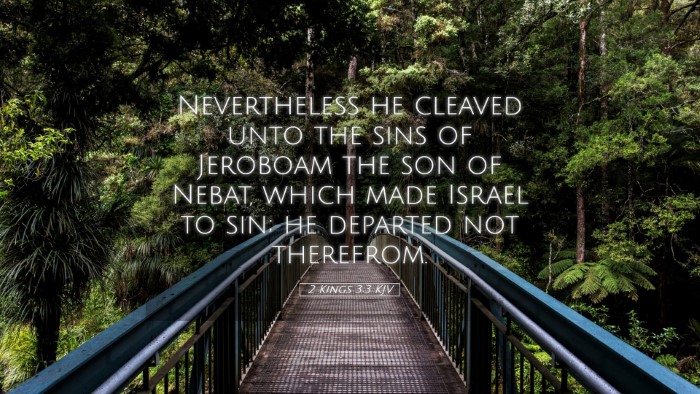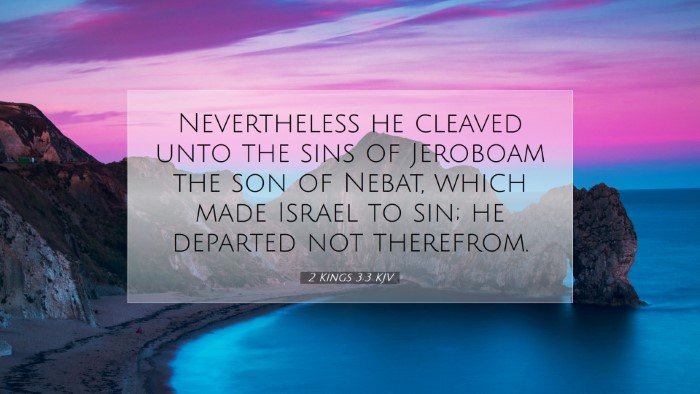Commentary on 2 Kings 3:3
Bible Verse: “Nevertheless Jehoram son of Ahab became king of Israel in Samaria, during the eighteenth year of Jehoshaphat king of Judah, and he reigned twelve years.”
Introduction
This verse introduces the reign of Jehoram, son of Ahab, marking a significant period in the historical narrative of the kings of Israel. The interplay between the kingdoms of Israel and Judah during this time is crucial for understanding the broader context of the prophetic messages and the moral state of the people. Various public domain commentaries shed light on the implications of Jehoram's reign, his character, and the spiritual condition of Israel under his rule.
Contextual Analysis
As noted by Matthew Henry, this verse situates Jehoram’s ascension to the throne amidst the existing political landscape dominated by his father, Ahab, whose legacy was marred by idolatry and conflict. The interregnum with Jehoshaphat, king of Judah, signifies a period of compromise yet indicates the diversification of leadership styles in Israel’s governance.
Albert Barnes highlights the importance of the eighteen-year reference to Jehoshaphat's reign, establishing a timeline that correlates prophetic events with the kings’ reigns. This context emphasizes the prophetic ministry of Elijah and Elisha during these times, where moral decay was rampant due to the worship of Baal and other idols prompted by Ahab’s influence.
The Character of Jehoram
Jehoram's character is further explored through the lens of the commentary by Adam Clarke, who emphasizes his attempts to bring some reforms, distinguishing him from his father Ahab. Jehoram’s reign, however, was not marked by a return to the worship of Yahweh; instead, he maintained a syncretism that blended worship of Yahweh with that of the Canaanite deities.
- Spiritual Compromise: Jehoram continued the sins of Jeroboam and Ahab, which included the veneration of Baal, showcasing Israel’s ongoing struggle with idolatry.
- Moral Decline: The moral fabric of society eroded, as the king did not fully endorse the worship of Yahweh, leading to societal ills.
- Brief Military Actions: Jehoram engaged in military actions against Moab (noted in the verses that follow), but his efforts were often a reflection of political necessity rather than genuine spiritual renewal.
Theological Implications
From a theological perspective, the reign of Jehoram serves as a stark reminder of the challenges of leadership in a divided kingdom. As highlighted in various commentaries, the spiritual and moral decay that characterized his reign serves as a case study for present-day leaders in understanding the weight of their spiritual responsibilities.
Matthew Henry offers insight into how the leadership's failings can influence an entire nation, wherein a king's deviation from faith impacts the populace, as demonstrated by the cyclical pattern of struggle and idolatry that followed Jehoram's example.
- Leadership and Influence: The importance of righteous leadership and the impact of a leader's spiritual state on the nation’s relationship with God is profound.
- The Need for Prophetic Voices: The role of prophets like Elisha during Jehoram’s reign serves as a vital counter to the king's disobedience and highlights God’s desire to guide His people.
Application for Present-Day Believers
In application to modern believers, the verse stands as a call to prioritize faithfulness over political expediency. Jehoram’s compromise offers a cautionary tale about the dangers of blending faith with cultural practices that deviate from true worship of God. Pastors and theologians can reflect on the implications of this in today’s contexts, considering the choices made by leaders and their resonance with the biblical exhortation to be faithful to God's covenant.
- Refusal of Idolatry: Believers are called to shun contemporary forms of idolatry, ensuring that allegiance to God supersedes all else.
- Emphasis on True Worship: Worship must be rooted in truth and spirit, and not be compromised by societal pressures.
- Righteous Leadership: The importance of aligning one’s leadership with biblical principles for the benefit of the community.
Conclusion
In summary, 2 Kings 3:3 provides a gateway into the complex narratives of Israel's kingship and prophetic involvement. With Jehoram's reign marked by compromised faith, the lessons drawn from this passage remain relevant. Scholars and students can glean from the historical context while pastors can find inspiration for addressing contemporary spiritual challenges, making this a pivotal verse in understanding Israel's history and God’s unwavering sovereignty amid human failings.


